From Mav: A few weeks ago, we did a show called “twentysomethingteen” where we talked about the phenomenon of casting fully grown adults as teens in TV shows for practical reasons (they can work longer hours) and the effect that had of creating characters who did not reasonably look like teenagers, especially compared to actual teen actors on shows appearing at the same time, and even sometimes on the same program; seriously, Jackie and Kelso on the first season or two of That 70’s Show is SOOOO uncomfortable to watch! While it wasn’t the main focus of that episode, we did talk about the sexualization of youth, in particular speaking to Brooke Shields’s breakthrough role as an a 12-year-old prostitute in 1978’s Pretty Baby. Obviously the creepy factor on that film is pretty high, but that’s supposed to be the effect of the character. Likewise for Jodie Foster’s character in Taxi Driver, Natalie Portman in Léon: The Professional, and even Kirsten Dunst in Interview with the Vampire. In each of those films, you’re supposed to look at the child playing the sexualized role and be very uncomfortable with it. This seems a little different than what happens with That 70’s Show where the sexualized relationship between Kelso and Jackie is supposed to seem normal… and it comes across as easy more creepy.
Then, this week, I was asked by my friend Ethan if we were planning to address the controversy around the new Netflix film Cuties (originally titled Mignonnes in French) on the show. At the time we actually weren’t. For those who missed it, Netflix bought a French indie film at Sundance, about a group of 11-year-old girls who form an overtly sexy dance troop. There was massive backlash for a bit, including #CancelNetflix trending on Twitter because obviously Netflix was trying to sexualize children and entice pedophiles. Of course, most people never saw the film, which any number reviews of the movie pretty much point out is the film is actually a criticism of the ways in which children, especially young girls, are sexualized by media. At first, I figured it wasn’t popular enough for us to deal with. Then I watched it, and I rather enjoyed the take the film uses. It actually focuses not only on the way in which media sexualizes girls, but also the tension between that and the inherent sexualization that they face from more conservative and religious upbringing. It basically argues that gender roles are implicitly sexualized and staunch adherence to them is harmful to children. And, like Pretty Baby and the other films, Cuties goes out of it’s way to make the viewer feel QUITE uncomfortable with how the girls are being portrayed. It reminds me of Eighth Grade or Kids in a way. You’re supposed to feel bad watching it. I liked it a lot.
And that’s great. But of course there’s the question of is it even possible to explore this concept without being guilty of the same issue you are trying to be critical of. Honestly, most people complaining about Cuties only saw the poster and maybe the trailer and made their snap decision based on that. And frankly, the girls in the film ARE sexualized. In fact, they are extremely aware of their sexuality as young girls and are playing into it. That’s part of what makes the film uncomfortable. On the other hand, shouldn’t there be someone being critical of it rather than just leaving the conversation to those who would use the concept to make money off of them. Some people have also criticized that perhaps no one would have cared about Cuties in the slightest if the children had been white, and pointed at Toddlers and Tiaras which really shares all of the same problems, yet with no critical eye at all. Is it a racial thing or are we simply not able to explore the concept because they are girls and that renders the subject matter immediately too provocative in our male gaze directed society? After all, Good Boys comedically explores some of the same themes, albeit comedically with boys as the protagonists instead of girls. That certainly didn’t seem as uncomfortable.
The girls in the film are specifically trying to emulate the sexualized culture they see themselves growing up in. They are addicted to likes on social media. They want to be like the pop stars they see in music videos. And there’s something to be said for that. Adolescent kids want to grow up as quickly as possible. And while we might be uncomfortable with a sexy 11-year-old, we seem to be perfectly fine with a sexualized 16-year-old and that is naturally who an 11-year-old would want to emulate. The girls’ dancing isn’t really any more scandalous than what Britney Spears, Taylor Swift or Rihanna did at 16. But somehow it *feels* different. Certainly we as a society have decided that it is inappropriate for adults to be sexually involved with teenagers. Isn’t part of the appeal of youth that it is somehow enticing to mix emerging sexuality with the idea of forbidden and uncorrupted innocence? Britney Spears didn’t wear a Catholic school-girl outfit in her first video on accident.
But there appears to be a point where it’s ok to let girls perform sexuality. Where is the line? Eleven is too young. Sixteen is fine. How would it have worked if they were thirteen? is it really just different for boys? And if we are so concerned about, why does the line just magically go away… at whatever age it goes away? At the end of the day, the reason Cuties was sexualized negatively is that we seem to not be able to not make those associations with female children under any circumstances… even ones that are theoretically altruistic, conservative or wholesome… the very thing that the film is actually complaining about. But I don’t want to focus on just that one film. It is only indicative of the larger issue. Why do we view code youth as sexual anyway? If we care about sexualizing girls too young, then why have so many aspects of female adolescence become synonymous with adult sexuality? Belly shirts, Pigtails, Catholic school uniforms, Knee-high socks? Infantilization appears to be a key aspect of hyperfeminization. Literally everything about now 27yo Ariana Grande is carefully crafted to make her look like a hypersexualized 13-14yo girl. On one hand, yes it is a problem that she is essentially selling the male gaze to children and creating expectations of what female sexuality should be, but on the other it seems unfair to criticize her for expressing her sexuality the way she wants to.
Do we do the same thing with young boy sexuality? For all his years of High School Musical mania, I honestly can’t think of anyone ever seriously complaining about perennially shirtless Zac Efron’s effect on young boys. On the other hand, I’ve also not really seen anyone complaining that their 12yo sons are working out too much. And I really don’t see a lot of complaints that 12yo boys are “too naked”. So is teen sexuality simply a mark of femininity (or hyperfeminininty) and masculinity is ignored? Even when adult males are dressed in teen-coded manners, we do not appear to see it as infantile in the same way. If I wear a baseball jersey or overalls as a 46yo man, it doesn’t send the same message as an adult woman doing it. In effect, Efron is doing the same thing as Grande. At 32yo today, much of his appeal is that he can still pass for a high school student if he wanted to… or at hypermasculine dream that a high school student might wish he could embody. In either case, the sexualization of youth is encouraged. Efron and Grande both appear “sexy” because they look like what we imagine the perfection of youth to be. They are… the pornographic ideal of youth. And in a world where we really do celebrate this sort of thing, is it even reasonable to expect actual young girls to have any different of a reading on media sexuality than we as adults do?
Let us know your thoughts!

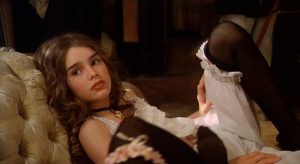

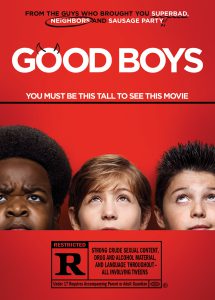
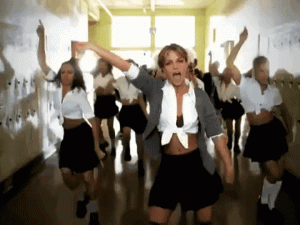
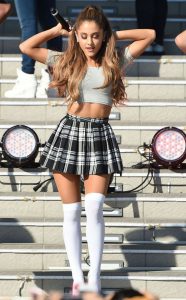
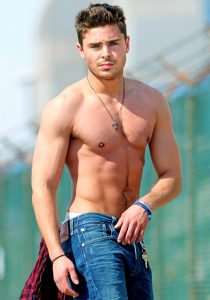

Carolyn Salvi: interested in coming back for this one (should fit in with the
“Kincaid v Mulvey” stuff we were discussing
Chris Maverick absolutely! Just give me time to actually watch “cuties” first ?
I don’t want to focus the whole show on Cuties. That was just my example. But sure. Probably sometime in the next week or so.
Yeah, but I’m the kind of nerd who needs to do her homework! Also I have some other theorists I want to bring into the conversation I wanna review!
So…. the thing about Jackie and Kelso is that my parents loved that show so i watched it when it was on and I never really thought they were weird together as a girl of that same age. Looking back at returns now? Yes, I see it.
But I think that really speaks to the headspace of a 14 or 15 year old girl. Nothing about that seemed abnormal. At the same time, it’s such an awkward time because, I mean, they are literally married now and no one would say that’s strange now that they’re both over 18.
So, while I think media does have a lot to do with the way girls express themselves, I also think that those expressions happen because they feel one way or another. By the time I was in high school I certainly knew what feminine wiles were and how to use sexuality to get things. But that wasn’t because of brittany spears videos. Or at least, they didn’t make me act that way. I acted that way because I liked it.
There was this great line in Lucifer (which I am binging) where someone asks one of the dancers in a night club if she had a good relationship with her father and she responded “I’m dancing half naked in a bar for money…. what do you think?” And I just feel like that’s such a cop out. I spent plenty of my life dancing for money in a bar and I have a great relationship with my family. I just liked feeling pretty and sexy and empowered.
I do think there’s a point where adults can easily coerce young girls into doing things they didn’t want to do because of the power difference. But I don’t think it’s fair to assume all 13 year olds expressing sexuality are somehow broken or in need of saving.
Id say its degrading not empowering but you do you I guess. And most 13 year olds who act that way have had something done to them or noticed the way they get attention is if theyre sexy to boys/men. Either way its not good, at 13 I was just a kid and not worried about that stuff mostly.
The only reason a 13 would act like that is if they realized that the way to get attention/love is to be sexy for men/boys. You even said it yourself it makes you feel “sexy or empowered” no 13 year old girl should acting sexy or worried about any of that stuff but they are. Girls are made to feel worthless if they arent considered sexy or attractive which shouldnt be in question for a 13 year old girl. I was mostly just a kid at 13 and didnt worry about that kind of stuff because I was kind of sheltered and Id prefer it that way.
I attempted to give this director credit, but alas. The movie was widely uncomfortable and I HATE how teenagers and kids are portrayed almost ALL the time
Its distorts a child’s mind so much
I’m not entirely sure where, but I feel like the movie “Kids” has to enter this conversation somewhere.
On the other side of your point, this is literally an image from Lord of the Flies. Over half the boys are wearing just underpants or loin cloths, yet nobody has a problem with this.
Rachel Coughran-Garwood Would probably have a better take than me, since I’m a privileged Cis male.
Tim Malone II I haven’t seen it, so I don’t want to judge the film directly, but in general I do think that children these days are trying to “grow up” in a sexual way to soon. In history 16 could be considered adult and still today in some parts of the world. But younger than that kids need to just to kids and not try to grow up so fast. You used to be able to tell someone’s age, but these days you have 13 year olds trying to be 25 and 35 year olds trying to be 18. And a large part of that is what is shown in media. There is a big difference between trying to look your best and trying to look like something you are not.
Just think this is only a problem for young girls who are pretty. Girls who are too different, or too big, or can’t dance, are not noticed.
I’m stuck at halfway through it. I did find it uncomfortable to watch Michael Bay’s camera directed at such young girls. But, I started watching it the day after listening to the VoxPopCast episode where Katya was talking about Bioshock Inifinite and Artaud’s Theater of Cruelty, so I understood the discomfort to be a tool to force the audience to think critically about what we’re watching: not just passively absorbing another tale of rite of passage (contrast with Stand By Me, where you’re effortlessly on the side of the young boys). But part of the discomfort is not just the camera, but their obvious ignorance as they try to act older (as well as the moments of wanton cruelty) and the clash of their different levels of “maturity” (as is very typical of people on the cusp of puberty).
Regarding the aspect of sexualization of young girls: I often think of the scene from American Beauty where Kevin Spacey doesn’t have sex with Mena Suvari: what he wanted was the fantasy of being desirable to the hottest girl in school with a Woman’s brain in her body (without the complications of lived experience – “baggage” we might say). Her actual inexperience ruins the fantasy. I see this as the healthy response to fantasy (though uncomfortably close to crossing lines at times). Contrasted with the unhealthy dealing with fantasy described by the dad in Capturing the Friedmans (IIRC, the dad confesses that his pedophilia arises from trying to recover a lost love from his youth).
Turning to the “controversy” over the film potentially encouraging “trafficking” or endangering children: That’s dumb as shit. This is young girls acting like young girls – awkward, fumbling, ignorant. Something that could encourage “trafficking” would be to depict young girls being rewarded for acting older than they are, or, you know, rewarded for prostitution (hello, Pretty Woman?!!!)
I should elaborate that the dad in Capturing… is trying to excuse his pathology by describing it as trying to recover a lost love.
maybe a way of thinking about cuties is as a clash/interplay of at least three fantasies: a maturity fantasy harbored by (pre)teens, a social fantasy about sexuality of young women, and parental fantasy about kids’ growth into adults?
You’re a sick fucking pedophile and you need a hard drive check. I hope you get cancer and die. Have a lovely day!